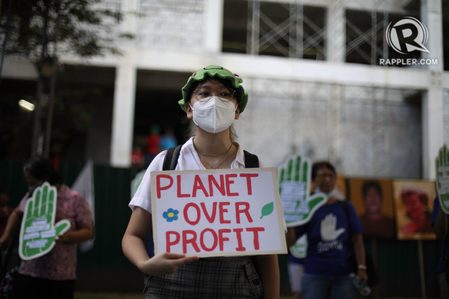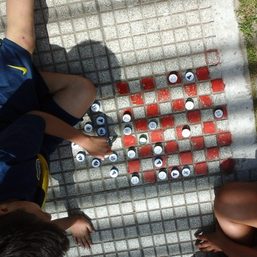SUMMARY
This is AI generated summarization, which may have errors. For context, always refer to the full article.
![[Science Solitaire] Too broken to change the ending?](https://www.rappler.com/tachyon/2021/12/ss-too-broken-to-change-ending.jpg)
The world recently delivered “Matrix.” He is a vibrant and handsome boy with eyes that exuded mischief and joy. He is the son of my non-biological son. Any grandma would have showered him with gifts and greetings, but given the pandemic settings and thousands of miles between us, those would have to be muted for now. In that vacuum, given what I am and what I do, I cannot help but worry a lot about him and his generation. I know that Matrix was born to the most wonderful humans, Mikki and Bryant, but Matrix is also now part of the web of life that is seriously fraying. Matrix is born at a time when even the youth right now are suffering from major anxieties about the world we live in, in ways that they never have before. It is not just from my observations but a study has confirmed it.
Sure, every generation has their own worries and fears, including existential threats like nuclear threats. But the threat now is on the basis of life itself – nature. The climate crisis has caused a level of anxiety among the youth all over the world that will define how they perceive and will respond to it. A study that had 10,000 young people aged 16-25 from countries that represented the “Global South” (low income countries) and Global North (high-income countries) from all over the world, respond to questions to measure their climate anxiety and it drew for us a picture of a generation gravely affected in terms of their psyche as to the effects of climate change on their current lives and their future.
Looking at the results that revealed that the greater proportion of the youth in this age bracket in many countries are really anxious about what climate crisis is doing to their lives and their future, you will have another layer of empathy for these young people now.
The average for all countries was that 83% of the youth surveyed think and feel that people have failed to care for the planet, and that 75% think the future is indeed frightening.
In that group, the young respondents from the Philippines topped the score at 93% and 92%, respectively.
For the older generations who remembered your youth as a most exciting time for hope and possibility? Imagine what it is like for this generation. In one of the questions in the study that categorized negative feelings about climate change, “Humanity is doomed” got an average response from all countries surveyed at 56%, with the Filipino youth respondents registering 73%! Granted that all scientific studies need to be repeated over and over for confirmation and greater validity, this glaring level of hopelessness from this landmark study for our youth should not be ignored. We have bred and live among the youth, who, despite being naturally wired for hope (and many will say are culturally conditioned to be optimistic), are not. Without hope, why should we wake up to live through sunrises and moonrises at all?
In other categories such as the effect of climate crisis on the youth having “less opportunity than parents,” “most valued will be destroyed,” and “family security will be threatened” where the global average was 55% for the first two and 52% for the last one, the young Pinoy respondents clocked in at 70%, 74%, and 77%. This is the generation we are urging and touting to save the future. They neither believe in a better future nor are they super-charged to think they can change it for the better.
This generation is experiencing the highest burden yet of the effects of climate crisis in the entire history of humankind. How they think and feel will shape their courage, creativity, and resolve to face the challenges. A certain level of “practical anxiety,” as the study cites, helps in preparing anyone for challenges but beyond that, they could also become stressors that could cripple their defenses and our responses.
With the very small window between now and 2030 – the year where if we do not keep the warming within 1.50C, the damages will be irreversible – we have to address the strength of mind and character of your youth to look at the crisis straight in the eye and mount scaled responses with the previous generation that has failed them.
As I was reading through the study, I was reminded of a map of tears that artist Rose-Lynn Fisher created that I turned to when I recently addressed an environmental group and partners. I have always been conscious that the map of the climate crisis was always accompanied by a landscape of agonies, sorrows and regrets within us all. There is a map there of tears shed for “things that cannot be fixed.”
We older people owe life and we owe this generation. We need to pull our youth from the trenches of despair, with the scarred but victorious energies of the battles that defined our generation, to help them find that place in their minds with clarifying tears that could embolden them to change the ending. We need to do this for Matrix and other wide-eyed bundles of joy and possibilities, who have as much right to live out their lives in this planet as previous generations. – Rappler.com
Maria Isabel Garcia is a science writer. She has written two books, “Science Solitaire” and “Twenty One Grams of Spirit and Seven Ounces of Desire.” You can reach her at sciencesolitaire@gmail.com.
Add a comment
How does this make you feel?


![[OPINYON] Diborsiyo sa mata ng isang anak](https://www.rappler.com/tachyon/2024/06/new-school-divorce-children-june-13-2024.jpg?resize=257%2C257&crop=294px%2C0px%2C720px%2C720px)








There are no comments yet. Add your comment to start the conversation.